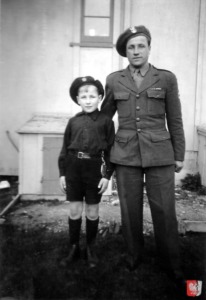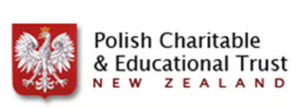Sources
Alexandrowicz, S.Monica 1998. “Z Lubcza na Antypody“. Seria: Ocalić od zapomnienia -1. Zgromadzenie Siótr Urszulanek SJK.
Beaupré-Stankiewicz, Irena, Danuta Waszczuk-Kamieniecka, and Jadwiga Lewicka-Howells. 1989. Isfahan – City of Polish Children. 3rd ed. London: Association of Former Pupils of Polish Schools, Isfahan and Lebanon.
Beaupré-Stankiewicz, Irena, Danuta Waszczuk-Kamieniecka, and Jadwiga Lewicka-Howells. 1987. Isfahan – Miasto Polskich Dzieci. 1st ed. London: Kolo Wychowanków Szkól Polskich, Isfahan i Liban.
Chibowski, Ks. Andrzej. 2012. Kapłańska Odyseja Ząbki. Original language edition. Polska: Apostolicum.
Chibowski, Dr. Andrzej. 2013. A Priest’s Odyssey. 1st English- language edition. Wellington, New Zealand: Future Publishing.
Dabrowski, Stanislaw. 2011. Seeds in the Storm. Waikanae, NZ: Maurienne House.
Ducat, Michelle, Mealing, David, Sawicka Theresa, and Petone Settlers Museum. 1992. Living in Two Worlds: The Polish Community of Wellington Wellington: Petone Settlers Museum/Te Whare Whakaaro o Pito-one
Jagiello, Józef. 2005. One Man’s Odyssey. Edition 2005. Józef Jagiello.
Department of Labour, New Zealand Immigration Service. 1994. Refugee Women: The New Zealand Refugee Quota Programme. Wellington: Department of Labour, New Zealand Immigration Service.
Lowrie Meryl. 1981 The Geneva Connection, Red Cross in New Zealand. Wellington: New Zealand Red Cross Society.
Manterys, Adam, Stefania Zawada, Stanislaw Manterys, and Józef Zawada. 2008. New Zealand’s First Refugees: Pahiatua’s Polish Children (2nd ed.). Wellington: Polish Children’s Reunion Committee.
Manterys, Adam, Stefania Zawada, Stanislaw Manterys, and Józef Zawada. 2012. New Zealand’s First Refugees: Pahiatua’s Polish Children (3rd ed.). Wellington: Polish Children’s Reunion Committee.
Manterys, Adam, Stefania Zawada, Stanislaw Manterys, and Józef Zawada. 2006. Dwie Ojczyzny: Polskie dzieci w Nowaj Zelandii Tułacze wspomnienia. Warszawa: Społeczny Zespól Wydania Książki o Polskich Dzieciach w Nowej Zelandii.
New Zealand Education Deptment. 1945. “Polish Children in New Zealand.” New Zealand School Journal, 1937-vol. 39 No 5, Part III:147-152.
Polish Women’s League. 1991. Wiązanka myśli i wspomnie / Koło Polek = A Bouquet of thoughts and reminiscences. Wellington, N.Z.: The League.
Rodgers, Owen. 2011. Adventure Unlimited – 100 years of Scouting in New Zealand 1908-2005. Wellington: Scout Association of New Zealand.
Ronayne Chris. 2002. Rudi Gopas – a biography. David Ling Publishing Limited.
Skwarko, Krystyna. 1972. Osiedlenie Młodzieży Polskiej w Nowej Zelandii w r. 1944. Londyn, Poets’ and Painters’ Press.
Skwarko, Krystyna. 1974. The Invited. Wellington: Millwood Press.
Spławska, Władysława Seweryn. 1993. Harcerki w Zwiądzku Harcerstwa Polskiego: Poczatki i Osiągnięcia w Kraju oraz 1939-1949 poza Krajem. Głowna Kwatera Harcerek ZHP poza Krajem.
Suchanski, Alina. 2006. Polish Kiwis: Pictures from an Exhibition. Christchurch: Alina Suchanski.
Suchanski, Alina. 2012. Alone : an inspiring story of survival and determination. Te Anau, N.Z.: A. Suchanski.
van der Linden, Maria. 1994. An Unforgettable Journey. Second Revised ed. Palmerston North: Dunmore Press.
Tomaszyk, Krystine. 2004. Essence. Palmerston North: Dunmore Press.
Tomaszyk, Krystyna. 2009a. Droga i Pamięć: Przez Syberie na Antypody. Warszawa: Wydawnictwo Trio.
Zdziech, Dariusz. 2007. Pahiatua – “Mała Polska” małych Polaków. “Societas Vistulana” .
Other Books
Beck, Jennifer, and Lindy Fisher. 2007. Stefania’s Dancing Slippers. Auckland: Scholastic New Zealand. [Children’s Book]
Domanski, Witold (Vic). 2011. A New Tomorrow: A story of a Polish-Kiwi family. Masterton, NZ: Tararua Publishing.
Jaworowska, Mirosława. 2011. Golgota i Wybawienie: Dzieci Pahiatua od Syberii do Nowej Zelandii – Cztery Pory Roku jak Cztery Pory Życia Warszawa: Studio Jeden.
Kałuski, Marian. 2006. Polacy w Nowej Zelandii. Toruń, Poland: Oficyna Wydawnicza Kucharski.
Lochore, R. A. 1951. From Europe to New Zealand: An Account of our Continental European Settlers. Wellington: A. H. & A. W. Reed in conjunction with the New Zealand Institute of International Affairs.
Lubelski, Katolicki Uniwersytet. 2007. Z Sybiru na drugą półkulę : wojenne losy Polskich dzieci z Pahiatua. Lublin: Wydawn. KUL.
Pobóg-Jaworowski, J. W. 1990. History of the Polish settlers in New Zealand, 1776-1987. Warsaw: CHZ Ars Polona.
Ogonowska-Coates, Halina. 2008. Krystyna’s Story: A Polish refugees journey. Dunedin: Longacre Press.
Roy-Wojciechowski, John, and Allan Parker. 2004. A Strange Outcome: The Remarkable Survival Story of a Polish Child. Auckland: Penguin Books.
Szymanik, Melinda. 2013. One Winter’s Day in 1939. Auckland: Scholastic. [Children’s Book]
Turol, Sophia. 2010. Sophia’s Challenging Journey: Self-published.
Wiśniewska-Brow, Helena. Give Us This Day. Victoria University Press.
Other Materials
CraftInc. Films. 2015. Polish Children of Pahiatua. 70th Reunion – HD. Wellington: CraftInc Films. Produced by Wanda Lepionka and David Strong. [Film].
Gillis, Willie Mae. 1954. The Poles in Wellington, New Zealand. Edited by Department of Psychology. Vol. No. 5 Publications in Psychology. Wellington: Victoria University College. [Research]
Krystman-Ostrowski, Teresa Marja. 1975. The Socio-Political Characteristics of Polish Immigrants in Two New Zealand Communities, Department of Politics, University of Waikato, Hamilton. [Thesis]
National Film Unit. 1944. Weekly Review 169. Wellington: National Film Unit.
O’Brien, Kathleen. 1966. The Story of Seven-Hundred Polish Children. Wellington: New Zealand National Film Unit. [Film]
Ogonowska-Coates, John Anderson in collaboration with Halina. 1996. Exiles: The Story of a Polish Journey. Wellington: Ace of Hearts Production in Association with Polish Television. [Film]
Sawicka-Brockie, Theresa. 1987. Forsaken Journeys, Department of Anthropology, Auckland University, Auckland. [PhD Thesis]
Stowarzyszenie Polaków w Christchurch. 2004. Poles Apart: Historia 733 Polskich Sierot. Christchurch: Canterbury Telivision (CTV). [Film]
Tomaszyk, Krystyna. 2009b. The Story of the Polish Children in Isfahan – Iran 1942-1944. [DVD]








